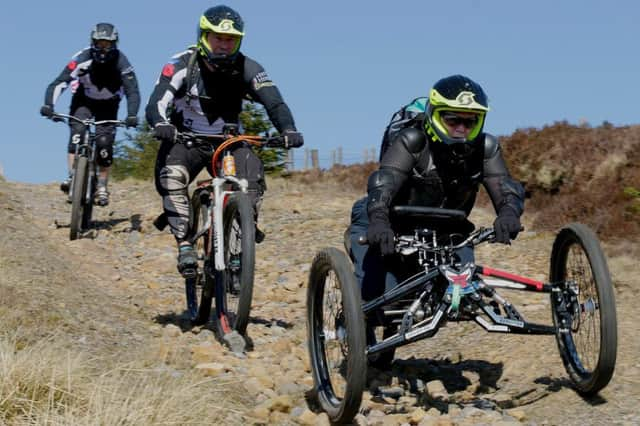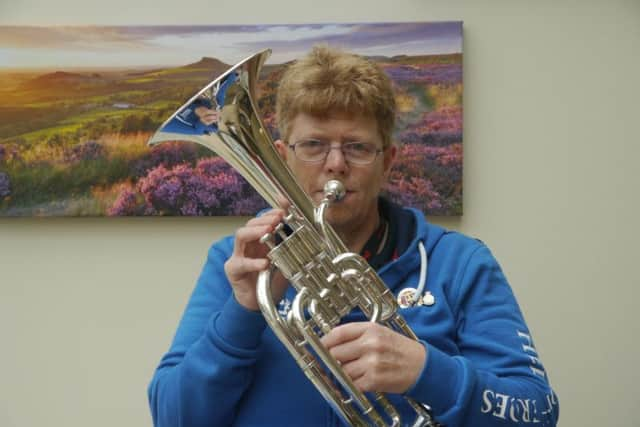Thrillseeker Anita gets her life back on track head-first


For the last 20 years Anita Bartram has struggled to even get out of the house.
When an operation to repair problems with her neck and arm went wrong she was left with a paralysed diaphragm, breathing issues and stomach problems. Her right leg is numb and she relies on a wheelchair to get around. But just a few weeks ago the former Army nurse was hurtling head-first down a Scottish mountain of speeds of up to almost 40mph.
Advertisement
Hide AdAdvertisement
Hide AdAnita, 54, from Kirkbymoorside was the only female and the oldest member of a Help for Heroes team of wounded, injured and sick veterans and services personnel that completed the mass-start endurance race, known as MacAvalanche, down the snow-capped Glencoe in Scotland.


“It was brilliant,” says Anita. “I used an off-road handtrike which I had to kneel on and go head-first, at speeds of almost 40mph. I had a good team behind me and just thought the whole thing was amazing.”
The experience was evidence of just how far Anita has progressed along her road to recovery since receiving support from Help for Heroes.
Anita joined the Army in 1991 after working as a nurse in Scarborough, London and Cambridge. She had planned to continue her nursing training to become a SRN (State Registered Nurse).
But it was not to be.


Advertisement
Hide AdAdvertisement
Hide AdAfter just over five years, three of them in Germany, she was medically discharged from the QA Royal Army Nursing Corps.
“I came home on leave on the ferry and woke up in my cabin with a crick in my neck which I thought was from sleeping in a strange position. But it never went away.” Doctors discovered that Anita had no pulse in her wrist and she was advised to have surgery on her neck to see what was happening.
“They thought that it could have been caused by a car crash I had years earlier in 1983. During the operation on my neck the nerves to my chest and arm were damaged.” As a result her diaphragm is paralysed, her right leg numb, she feels sick all the time due to stomach problems and is in constant pain.
“I was discharged from the Army which was awful and I couldn’t work because I was in so much pain. I was very active before the operation. I loved going out on my bike.” While at Ryedale School, Anita was also a keen athlete – playing hockey and netball and competing at a national level in judo. But after the accident she could hardly even get out of the house.
Advertisement
Hide AdAdvertisement
Hide Ad“It starts to affect you mentally as well as physically,” says Anita who lives alone. “You lose your self confidence.”
Her only respite was to be found in baking cakes until it eventually became too much after she moved from her flat.
“Soon after moving into my rented bungalow, two years ago, I had a mental breakdown – unable to cope with being in a wheelchair in so much pain and no support to deal with what was happening with my health. It was then that I was referred to Phoenix House at Catterick Garrison where I was told I could be supported for life. But I hadn’t lost a limb or been blown up like some of the veterans there, and found it difficult to accept help,” says Anita. “But then I took part on what is called a Rolling Recovery Programme and, through that, have learned to horse ride, go swimming regularly and discovered that there are bikes that enable me to go cycling – on and off road.
“I realised that I would rather do too much and be in pain, than do nothing and still be in pain.”
Advertisement
Hide AdAdvertisement
Hide AdShe says it really helped to be among other people, especially those who could understand her problems without constantly having to explain.
Her confidence improved so much that she plucked up courage to play her E-flat tenor horn in public for the first time in almost 25 years by joining the Kirkbymoorside Community Band. “Music has been an enjoyment of mine for a long time – I used to play in Kirkbymoorside town band – but recently my enjoyment has come just from listening to CDs and the radio,” she said. “I struggled to play my horn because of the problems with my diaphragm. But Phoenix House gave me the confidence to give it a go and I think it has actually helped,” says Anita.
“I decided to join a local community band which is for people who haven’t played for a long time, or older people who have just started playing. I was nervous when we played in public for the first time, but in the end it wasn’t so bad.
“Going back to a band has been just great – being part of a team, learning new things and feeling useful gives me a sense of achievement and quite a buzz. I went back feeling very apprehensive and started playing second horn parts. Now, I am playing solo horn parts and thoroughly enjoying it.”
Advertisement
Hide AdAdvertisement
Hide AdAnita is now taking part in more sport than she has done for more than 20 years but being on a bike in the fresh air is what she is enjoying most.
“It’s something I never thought I would do again and, after MacAvalanche, I am desperately looking for something else to challenge myself.
“I am hoping to do a similar event next year but over three days in France, but there are a lot of logistics.”
Help for Heroes is launching a new Wellbeing focus to help people like Anita.
Advertisement
Hide AdAdvertisement
Hide AdJohn Crudgington, Head of Health and Physical Wellbeing at Help for Heroes, said: “Improving wellbeing is vital to recovery. It is not about being supremely fit, but staying active and adopting healthy lifestyle behaviours. It’s about our Heroes getting the tools they need to be calmer, healthier, and more resilient – to be their best.”
MacAvalanche is a three stage Enduro race that takes place annually on the Glencoe Mountain in Scotland. The final stage is a mass start – this year involving 340 participants – from above the snowline. The less snow there is, the higher the cyclists have to climb with their bikes in order to start.
Help for Heroes has launched a new Wellbeing focus, to encourage its beneficiaries to help themselves improve their overall health and wellbeing.
Throughout the summer, on social media and the Help for Heroes website, there will be nutrition tips, advice on how to relax and sleep better, and sharing the health benefits of getting outdoors, as well as a series of yoga videos.
www.helpforheroes.org.uk